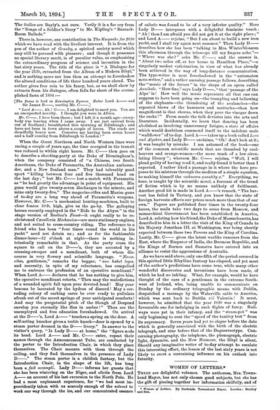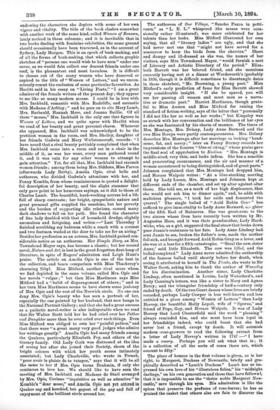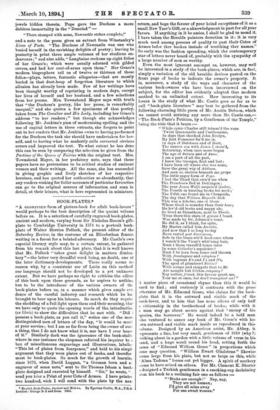WOMEN OF LETTERS.* THESE are delightful volumes. The authoress, Mrs.
Towns- head Mayer, has not only chosen good subjects, but she has the gift of piecing together her information skilfully, and of • Women of Letters. By Gertrude Tovrnahend Mayer. London : Bentley and Son. endowing the characters she depicts with some of her own vigour and vitality. The title of the book clashes somewhat with another work of the same kind, called Women of Renown, lately noticed in these columns ; and it is inevitable that in two books dealing with feminine celebrities, the same ground should occasionally have been traversed, as in the account of Sydney, Lady Morgan. This is an epoch of book-making, and of all the forms of book-making, that which collects graphic sketches of "persons one would wish to have seen" under one cover, as we would fain collect our dearest friends under one roof, is the pleasantest and most harmless. It is difficult to choose out of the many women who have deserved or aspired to the title of "Women of Letters," and we uncon- sciously resent the exclusion of some particular favourites. As Hazlitt said in his essay on "Living Poets," "I am a great admirer of the female writers of the present day; they appear to me like so many modern muses. I could be in love with Mrs. Inchbald, romantic with Mrs. Radcliffe, and sarcastic with Madame d'Arblay ; " and he goes on to cite Mary Lamb, Mrs. Barbauld, Hannah More, and Joanna Baillie. Of all these "muses," Mrs. Inchbald is the only one that figures in Women of Letters, and we quite agree with Hazlitt when we read of her beauty and great personal charm. Wherever she appeared, Mrs. Inchbald was acknowledged to be the prettiest woman in the room, and Mrs. Shelley, daughter of her friends Godwin and Mary Wollstonecraft, records: "I have beard that a rival beauty pettishly complained that when Mrs. Inchbald came into a room and sat in a chair in the middle of it, as was her wont, every man gathered round it, and it was vain for any other woman to attempt to gain attention." Yet, for all that, Mrs. Inchbald had staunch women-friends; among them being Mrs. Siddons, Miss Farren (afterwards Lady Derby), Amelia Opie, rival belle and authoress, who divided Godwin's attentions with her, and Fanny Kemble, from whose reminiscences is quoted a delight- ful description of her beauty, and the slight stammer that only gave point to her humorous sayings, as it did to those of Charles Lamb. The beautiful, hard-working actress led a life full of sharp contrasts; her bright, sympathetic nature and great personal gifts supplied the sunshine, but her poverty and the burden of supporting idle relations, caused many dark shadows to fall on her path. She found the character of fine lady doubled with that of household drudge, slightly anomalous and fatiguing, and writes :—" Last Thursday I finished scrubbing my bedroom while a coach with a coronet and two footmen waited at the door to take me for an airing." Besides her profession as an actress, Mrs. Inchbald gained con- siderable notice as an authoress. Her Simple Story, as Mrs. Townshend Mayer says, has become a classic; but her second novel, Nature and Art, is lost in. the great forgotten dust-heap of literature, in spite of Rogers' admiration and Leigh Hunt's praise. The article on Amelia Opie is one of the best in the collection, and bears comparison with Miss Thackeray's charming Sibyl. Miss Mitford, another rival muse whom we find depicted in the same volume, called Mrs. Opie and her novels " vulgar ; " but then Miss Martineau says Miss Mitford had a "habit of disparagement of others ; " and in her turn Miss Martineau seems to have shown some jealousy of Mrs. Opie and the rest of the Norwich circle. No one can deny Mrs. Opie's beauty who has seen a portrait of her, especially the one painted by her husband, that now hangs in the National Portrait Gallery; and that she had a great success as a pathetic novel-writer is also indisputable when we read that Sir Walter Scott told her he had cried over her Father and Daughter more than he ever cried over such things. Even Miss Milford was obliged to own her "painful pathos," and that there were "a great many very good judges who admire her writings greatly." Amelia Opie had many friends among the Quakers, particularly Elizabeth Fry, and others of the Gurney family. Old Lady Cork was distressed at the idea of seeing her after she joined their Society, shorn of the bright colours with which her youth seems intimately associated; but Lady Charleville, who wrote in French, "pour avoir le plaisir de te tutoyer," says that it will be all the same to her if Mrs. Opie turns Brahmin, if only she continues to love her. We should like to have seen the meeting of Mrs. Inchbald and Madame de Steel arranged by Mrs. Opie, Corinne "inquisitive as well as attentive" to Kembleli "dear muse," and Amelia Opie not yet attired in Quaker cap and kerchief, but gayest of the gay and full of enjoyment of the brilliant circle around her. The authoress of Our Village, " Sancho Panza in petti- coats," as "L. E. L." whispered (the muses were ma- sionally rather ill-natured), was more celebrated for her talents than her looks. Miss Mitford illustrated her own saying, that all "literary ladies" are ugly, and that she had never met one that "might not have served for a scarecrow to keep the birds from the cherries." Short and dumpy and ill-dressed as she was, the names of her- visitors, says Mrs. Townshend Mayer, "would furnish a sort of Literary and Artistic Directory of the period." Eliza- beth Barrett was her beloved friend, and she mentions. cursorily having met at a dinner at Wordsworth's (probably in 1836, though it is difficult sometimes to disentangle dates in these sketches), "Mr. Browning, a young poet." Miss Mitford's early prediction of fame for Miss Barrett showed very considerable insight. "If she be spared, you will see her passing all women and most men as a narra- tive or dramatic poet." Harriet Martineau, though grate- ful to Miss Austen and Miss Mitford for raising the standard of fiction-writing, says of the latter that "personally I did not like her so well as her works;" but Kingsley was as struck with her conversation and the brilliance of her eyes as she was fascinated by his charm of manner. The times of Mrs. Montagu, Mrs. Delany, Lady Anne Barnard and the- two Miss Berrys were partly contemporaneous. Mrs. Delany describes Mrs. Montagu after her marriage as looking "hand- some, fat, and merry ; " later on Fanny Barney records her impressions of the famous " blue-stscking," whose praise gave the final seal of approbation to Evelina. "Mrs. Montagu is. middle-sized, very thin, and looks infirm. She has a sensible and penetrating countenance, and the air and manner of a.. woman accustomed to being distinguished, and of great parts.' Johnson complained that Mrs. Montagu had dropped him,. and Horace Walpole writes : "At a blue-stocking meeting held by Lady Lucan, Mrs. Montagu and Johnson kept at different ends of the chamber, and set up altar against altar there. She told me, as a mark of her high displeasure, that she would not ask him to dinner again," and, he adds with malicious pleasure, "I took her aside and fomented the quarrel." The single ballad of "Auld Robin Graw " has sufficed to give immortality to Lady Anne Barnard, ghter of the fifth Earl of Balcarres. She was great-aunt to the two sisters whose lives have recently been written by Mr. Augustus Hare, and it was their grandmother, Lady Hard- wicke, who, as a girl, suggested the final straw that broke down. poor Jeanie's resistance to her fate. Lady Anne Lindsay had, sent Jamie to sea, broken the father's arm, made the mother fall sick, and brought forward Auld Robin Gray as a lover, and she was at a loss for a fifth catastrophe. "Steal the cow, sister Anne,' said little Elizabeth. The cow was 4fted, and the ballad completed." Lady Anne never admitted the authorship of the famous ballad until shortly before her death, when seeing it attributed to herself in The Pirate, she wrote to Sir Walter Scott, asking him to thank the author of Waverley for his discrimination. Another sister, Lady Charlotte Lindsay, often mentioned in Louisa, Lady Waterford's, and, Lady Canning's letters, was like a sister to Mary and Agnes
Berry; and the triangular friendship of half-a-century only ended by death. Of the two Court dames whose lives are briefly recorded, perhaps Lady Cowper is less well-known and less entitled to a place among " Wortien of Letters" than Lady Hervey, the beautiful Molly Lepell, wife of " Sporus," and friend of Pope, Gay, and Horace Walpole. It was of Lady Hervey that Lord Chesterfield said the word " pleasing ' always reminded him, and she must have been loyal in, her friendships indeed, who could boast that she had.
never lost a friend, except by death. It will astonish modern -rose-growers to read the following extract from a letter of Lady Hervey's written in 1747 :—" I have- made a rosery. Perhaps you will ask what that is ; it is a collection of all the sorts of roses there are, which, amount to fifty."
The place of honour in the first volume is given, as is her right, to Margaret, Duchess of Newcastle, briefly and gra- phically described as "Lamb's Duchess." Lamb has so im- pressed his own love of his "illustrious foliose his "midnight darlings," on his own generation and those that have followe I,
that it is impossible to see the "thrice noble Margaret New- castle," save through his eyes. His admiration is like the spices that preserve the perfume of rose-leaves; he has so praised the casket that others also are fain to discover the
jewels hidden therein. Pope gave the Duchess a more dubious immortality in the " Dnnciad " •— "There stamped with arms, Newcastle sahres complete," and a note to the poem gives an extract from Winstanley's Lives of Poets. "The Duchess of Newcastle was one who busied herself in the ravishing delights of poetry ; leaving to posterity in print three ample volumes of her studious en- deavours ;" and also adds, " Langbaine reckons up eight folios of her Grace's ; which were usually adorned with gilded covers, and had her coat-of-arms upon them." Her Grace's modern biographers tell us of twelve or thirteen of these folios—plays, letters, fantastic allegories—that are mostly buried in that dust-heap of forgotten literature to which allusion has already been made. Few of her writings have been thought worthy of reprinting in modern days, except her lives of herself and her husband, and a few selections from her poems. Mrs. Townshend Mayer says with truth that "the Duchess's poetry, like her prose, is remarkably unequal," and she quotes a few specimens of that poetry, taken from The Cavalier and His Lady, including her Grace's address "to her readers ; " but though she acknowledges following Mr. Jenkins's plan of modernising spelling and the use of capital letters in these extracts, she forgets to point out to her readers that Mr. Jenkins owns to having performed for the Duchess the task she should have undertaken for her- self, and to having what he modestly calls corrected obvious errors and improved the text. To what extent he has done this can be seen by comparing the selection he gives from the Pastime of the Queen of Fairies with the original text. Mrs. Townshend Mayer, in her prefatory note, says that these papers have no pretensions to be critical studies of eminent women and their writings. All the same, she has succeeded in giving graphic and lively sketches of her respective heroines, and has quoted her authorities so abundantly, that any readers wishing for fuller accounts of particular favourites can go to the original sources of information and scan in detail, at their leisure, what is here represented in miniature.








































 Previous page
Previous page